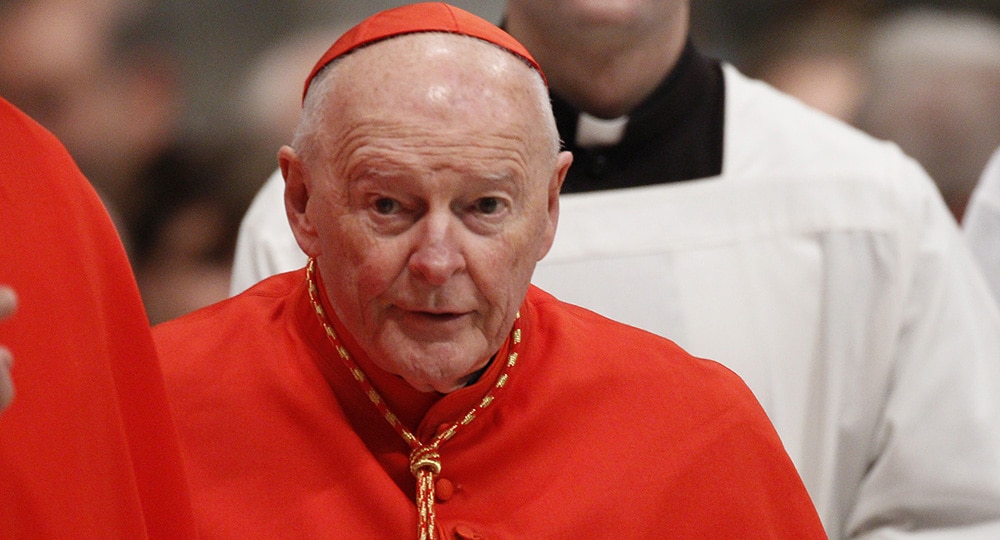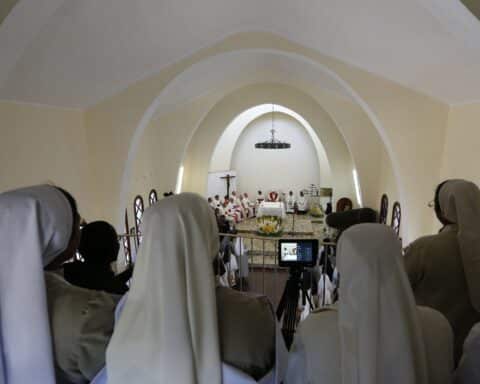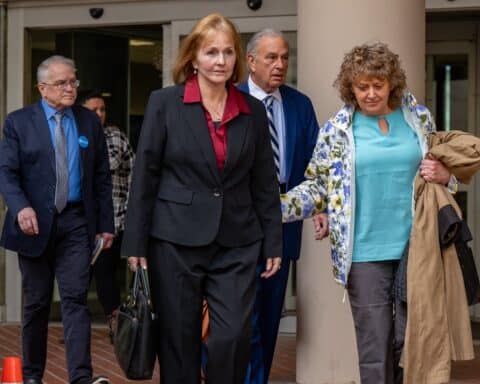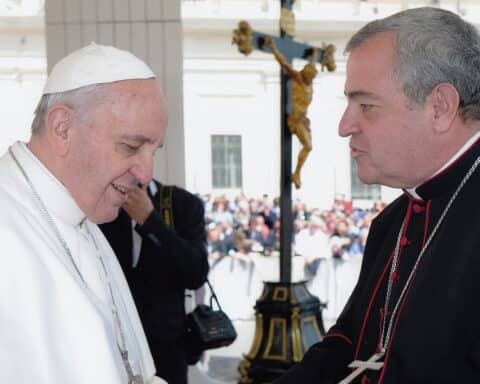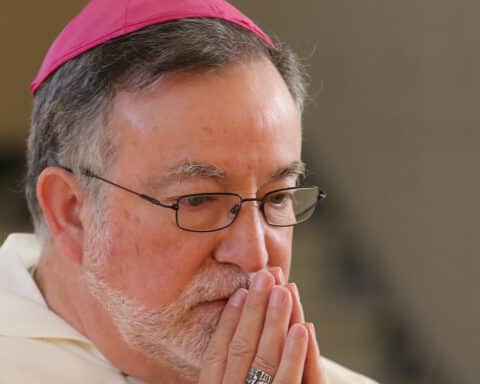For more than 30 years, Father Boniface Ramsey tried to tell any Church leader who would listen about his concerns regarding former Cardinal Theodore McCarrick’s inappropriate behavior with young priests and seminarians.
“He certainly got the benefit of the doubt,” Father Ramsey told Our Sunday Visitor in a telephone interview a couple of days after the Vatican released its 450-page report on how McCarrick, the former cardinal-archbishop of Washington, climbed the ecclesial ladder despite well-known rumors of sexual abuse.
Father Ramsey was one of the first people to blow the whistle on McCarrick, whom the Vatican removed from the clerical state in January 2019 after the Congregation for the Doctrine of the Faith found him guilty of “solicitation in the sacrament of confession and sins against the Sixth Commandment with minors and with adults, with the aggravating factor of the abuse of power.”
In the late 1980s, Father Ramsey was a Dominican priest and a faculty member of Immaculate Conception Seminary at Seton Hall University in New Jersey when he told his rector about the stories he was hearing — namely, that McCarrick, then the archbishop of Newark, was inviting seminarians for overnight visits at his beach house on the Jersey Shore and sharing his bed with them.
Those concerns were never followed up on, but Father Ramsey still tried to ring the alarm in Church circles as he later became a parish priest for the Archdiocese of New York and as McCarrick went on to receive a cardinal’s red hat.
In 2018, when allegations of child sex abuse against McCarrick were made public, Father Ramsey approached the news media with his concerns, which helped to spur calls for a Vatican investigation into McCarrick’s career.
Father Ramsey, 75, now the pastor of St. Joseph Church in New York City, said he feels vindicated now that the McCarrick Report has been published. He reflected on the report’s findings and shared his thoughts on how McCarrick was able to duck accountability for decades.
Our Sunday Visitor: When you read the McCarrick report, what jumps out at you?
Father Boniface Ramsey: Reading through the report, I realize now I was not the only (whistleblower). I must have been the first one in the seminary to raise objections. But I was certainly not the first one to contact the nuncio at the time. There was a lot of activity and a lot of concerns around McCarrick. Some of it, however, was not really well-focused.
Also, near the beginning of the report, there is a section about a mother who had written to every cardinal in the United States about her concerns because she saw (McCarrick) with his hands on her son’s thighs. She saw this and tried to do something about it, but she never got a response. It breaks your heart. I mean, here is a mother trying to protect her children. That is to me the most poignant part of the entire thing that I’ve read thus far.
Our Sunday Visitor: Do you think clericalism played a role in McCarrick’s rise up the ecclesial ladder?
Father Ramsey: He certainly got the benefit of the doubt. There were these bishops in New Jersey who saw McCarrick do things. The report mentions how in Newark, there was a gathering in a huge banquet hall, where McCarrick is sitting with a young priest and is seen fondling the young man in the presence of a handful of bishops and a monsignor, who apparently never said anything until he was interviewed for the report. But when the time came for the bishops to weigh in on whether McCarrick should go to Washington or be advanced or not, they never said a word about it. These bishops failed in their responsibility.
Our Sunday Visitor: In the late 1980s, as a seminary professor in New Jersey, you were among the first priests to report concerns about McCarrick’s behavior. What prompted you to come forward?
Father Ramsey: I was a Dominican priest at the time when I arrived at the seminary in 1987 or 1988. You can be sure that these (rumors) were floating around well before I got there. I took my concerns to the rector. The only reason I could have done it at all was because I was a Domnican, not subject to the archbishop in the way that diocesan priests would have been.
This was something virtually everyone knew about. Certainly the majority of priests at the seminary knew about it. I would think lots of priests outside the seminary knew about it as well. But the feeling at the time seems to have been, “This is very strange, but this is the way the archbishop is. He invites people as he does, but never touches them.” It was viewed as very odd, but acceptable.
Our Sunday Visitor: Did you ever have any conversations with other Church leaders about McCarrick’s behavior?
Father Ramsey: In July 2004, I had just started serving in the Archdiocese of New York, though I wasn’t, strictly speaking, incardinated yet. Cardinal Edward Egan [the former archbishop of New York] called me to his office one day, and I ended up being with him for about an hour. Somehow or other, McCarrick’s name came up. I said something about McCarrick, and clearly Cardinal Egan did not want to hear about it. He waved his hands in my direction as if to say, “We’re not going to talk about this.” Egan knew about the rumors. Maybe [former New York archbishop Cardinal John] O’Connor had told him, but then again everybody knew about those rumors.
Our Sunday Visitor: Why did you reach out to Cardinal Seán O’Malley, who oversees the Pontifical Commission for the Protection of Minors, after you saw then-Cardinal McCarrick at Cardinal Egan’s funeral in 2015?
Father Ramsey: Seeing (McCarrick) there really upset me. That’s when I wrote to O’Malley, and got an anodyne response from his secretary. I asked a trusted friend who I had consulted since the 1980s about what I should do. He said, “Just leave (McCarrick) alone.” He said McCarrick would have his final judgment to face. So I didn’t bother. For three years, until 2018, I didn’t do anything.
Our Sunday Visitor: In 2000, you had written about your concerns to the then papal nuncio, Archbishop Gabriel Montalvo. Yet the only response you received was an oblique reference in a 2006 letter from the Vatican on an unrelated matter?
Father Ramsey: That’s correct. Oblique is the right word. And you know what, you’re not supposed to keep those letters. I kept it, plus the envelope, actually, without telling anybody. It was only in 2018 that I realized this was important. Someone pursued me on this, and I managed to retrieve the letter among my correspondence. It was then that I realized what an important letter this was.
Our Sunday Visitor: Why did you go public with your concerns in 2018?
Father Ramsey: I contacted The New York Times immediately after the child abuse first emerged. I wanted to fill out the picture. What I knew didn’t involve children; it was seminarians. At the time, it looked like that now, at last, somebody was going to pay attention to what I had to say. And, of course, once it gets into the Times, it gets taken seriously.
Our Sunday Visitor: What was your reaction to learning about the allegations involving sexual abuse of minors?
Father Ramsey: That was so new to me, as it was to everybody. I don’t think anybody knew about that. I would think those are two completely different things, harassment/abuse of adults and abuse of children. I would have thought that the person who abused adults wouldn’t necessarily be interested in children, or vice versa. Those are two different proclivities. That was my initial thought.
Our Sunday Visitor: Do you think the clerical culture described in the McCarrick Report can be uprooted?
Father Ramsey: No, it won’t be totally uprooted until there’s no benefit in being a clergyman. Only then will the clerical culture be uprooted. But even in situations when the Church is persecuted, there is still a clubbish atmosphere among the clergy. The clubbish atmosphere is what came to McCarrick’s defense. The benefit of the doubt in his favor was very important.
Our Sunday Visitor: Pope John Paul II, and Pope Benedict XVI to a lesser extent, are criticized in the report for their handling of the concerns related to McCarrick. Are those criticisms fair?
Father Ramsey: From everything I’ve heard and read, with the Marcial Maciel case for example, John Paul just had a hard time believing these things about clerics. He probably hadn’t come across this kind of thing. The report says John Paul II had had experiences of priests’ names being blackballed by the Communist regime in Poland, so he thought something like that may have been going on here.
As for Benedict XVI, he came in like gangbusters. He was going to clean up the squalor in the Church. That was kind of his campaign speech to all the cardinals [before the 2005 conclave]. And then he didn’t. He made a few steps. It wasn’t up to him to interview McCarrick personally, but I don’t think he needed to do that. Anyway, McCarrick lied. McCarrick was a liar. What are you going to do when a cardinal lies in front of you? Benedict could have been stronger in what he wanted, but he wasn’t. I think that comes across in the report.
Our Sunday Visitor: In the last couple of years, we’ve seen Pope Francis implement reforms regarding bishops’ accountability, abolishing the “pontifical secret” in clergy abuse cases, and instructing Church authorities to report suspected abuse to the authorities when required by civil laws. Do these measures go far enough?
Father Ramsey: It’s good to have these made explicit, but these are things that were known all along. It’s just making explicit what common sense should have told the bishops, that if somebody does something criminal, that person has to be brought to the civil authorities. That’s the way it is.
What’s helped in this situation is that these things have come to the fore. Now everybody is aware, and nearly everybody is more careful. Although, someone who phoned me earlier today was telling me of an egregious incident that happened two years ago. I won’t say who or where, but you’d think that people would be smarter by now. I think these things will go on as long as people think they can get away with them.
Brian Fraga is a contributing editor for Our Sunday Visitor.

